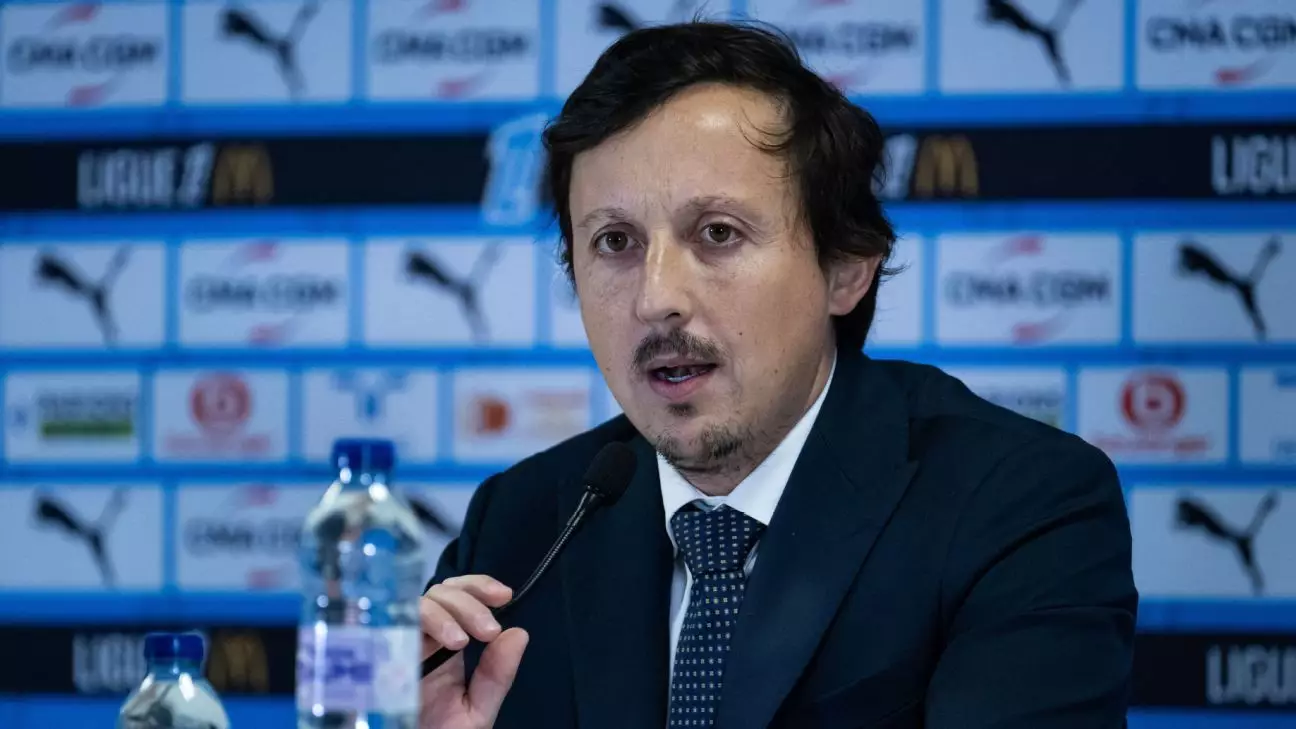The landscape of French football has been rocked by allegations and outrage following a turbulent encounter that saw Olympique de Marseille suffer a 3-0 defeat against Auxerre in Ligue 1. This crushing loss was not just about the scoreline; it ignited a firestorm of accusations from Marseille’s president, Pablo Longoria, who launched a vehement tirade against the refereeing standards in France. Longoria’s assertions have led to significant pushback from the French Football Federation (FFF) and the referees’ union, placing the integrity of the sport under scrutiny.
Pablo Longoria’s discontent was fueled not only by the loss itself but also by what he deemed a series of dubious officiating decisions. His allegations of “true corruption” and claims that his club was the target of a transpiring conspiracy caught the attention of the media and the football community alike. This outburst wasn’t merely an emotional reaction to a defeat; it reflects a broader trend within Ligue 1 where clubs increasingly confront refereeing decisions that they perceive as unfair. Marseille’s woes this season—finding themselves lagging 10 points behind the dominant Paris Saint-Germain—have undoubtedly exacerbated Longoria’s frustrations.
While criticism of referees is not unprecedented in football, the severity of Longoria’s claims marks a new escalation in discourse. His statement resonated beyond the confines of the match, striking at the heart of the game’s governance and eliciting immediate reactions from the FFF and the referees’ union, SAFE.
Philippe Diallo, the president of the FFF, was quick to condemn Longoria’s remarks, articulating strong support for referee Jérémy Stinat, who was at the center of the controversy. Diallo’s statement underscores a broader stance that seeks to protect the integrity of the refereeing body from unfounded allegations. He characterized Longoria’s comments as defamatory, which could bring into question not only the reputation of the individual officials but also the very governance of football in France.
In addition to the FFF’s condemnation, SAFE announced plans to escalate the matter by seeking an investigation from the federation’s ethics committee. The potential for legal action against Longoria and those who have issued hate messages following the match brings into focus the escalating tensions in French football. Such a response indicates that officials and referees are not simply passive recipients of criticism—they will defend their dignity and authority vigorously.
The ramifications of this match extend well beyond the 90 minutes played on the pitch. Previous incidents involving Marseille, including a suspension for their director of football, Mehdi Benatia, reflect an ongoing narrative of confrontation between the club and match officials. These recurring incidents suggest that Marseille’s frustrations are rooted deeper than a single match or decision; they tap into a perceived trend of unfavorable officiating against the club.
Coach Roberto De Zerbi added to the discourse by labeling Cornelius’ red card as “scandalous,” suggesting that refereeing standards in France may significantly hinder the sport’s credibility. His statement alarmingly hinted at the potential influence of prior controversies on officials’ performances.
The involvement of former Marseille player Fabrizio Ravanelli, now serving as an advisor to the club, illustrates that discontent not only resides with management and coaching staff but has also seeped into the community of former players, who are increasingly vocal about their grievances.
In the wake of these events, constructive dialogue appears to be necessary for the preservation of the sport’s integrity. While emotions run high and accusations fly, stakeholders—from club presidents to referees—must engage collaboratively to address perceived injustices without resorting to legal threats or tarnishing reputations.
The unfolding situation surrounding Olympique de Marseille and the subsequent reactions highlight a critical junction for French football. While the flames of controversy may seem damaging in the short term, they may also present an opportunity for reform and a renewed commitment to fair officiating. As the league moves forward, the challenge lies in ensuring that the beautiful game is played and officiated with integrity and respect, thereby maintaining the trust of players, coaches, and fans alike.

